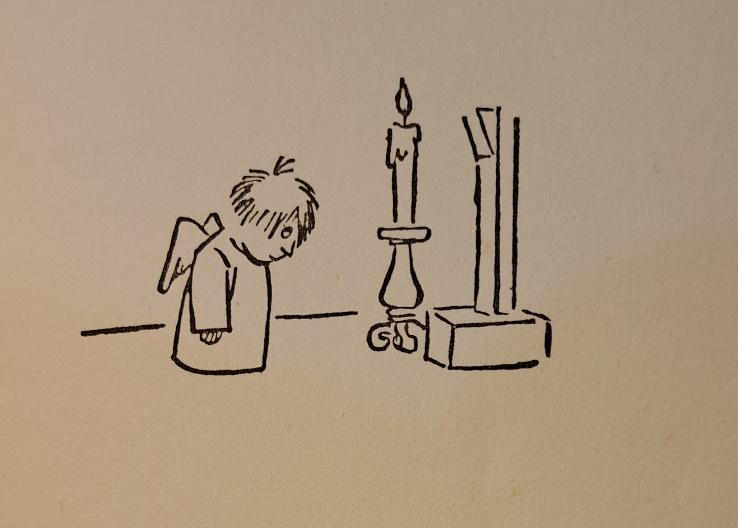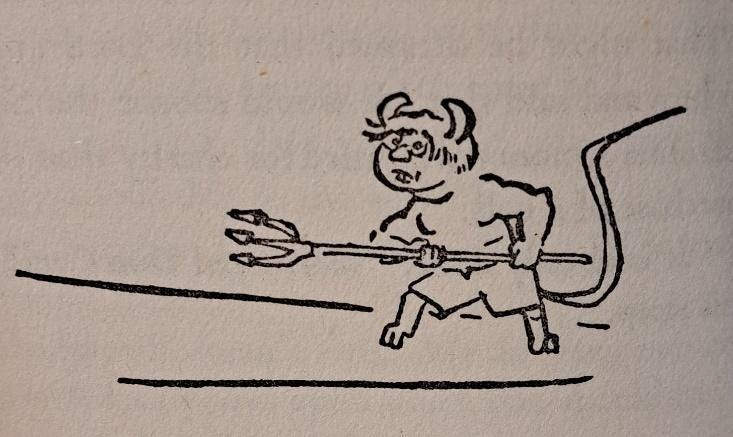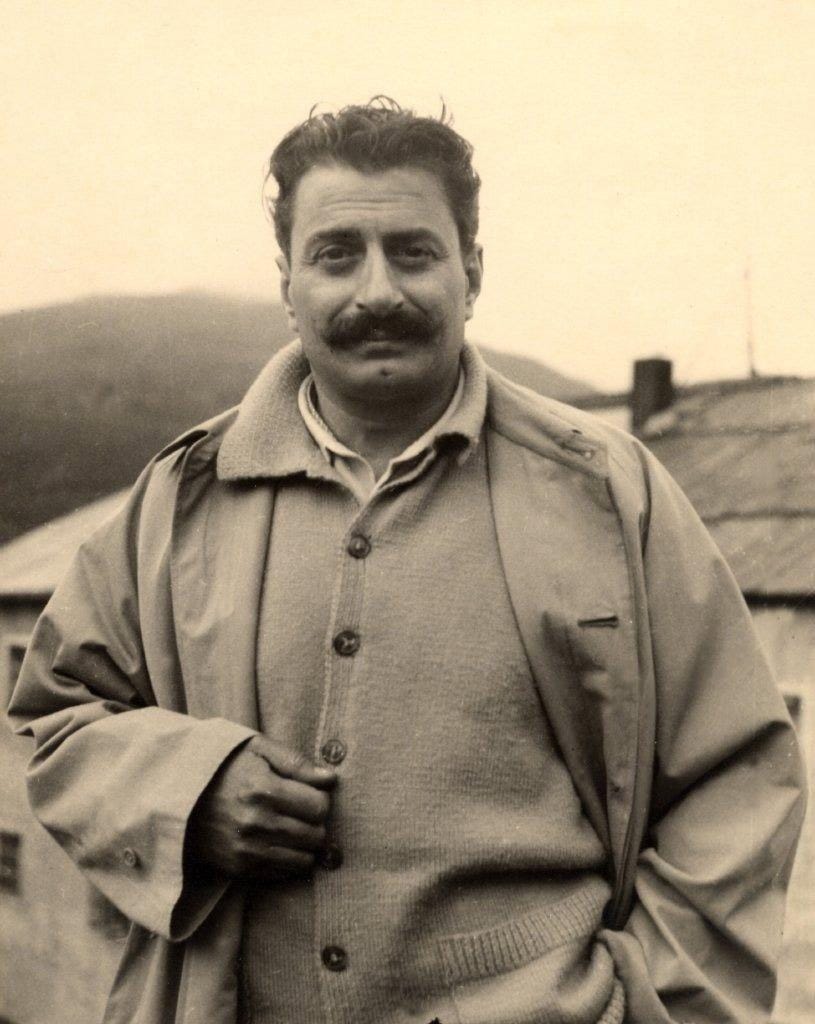The Adorable Little World of Don Camillo
and its surprising connection to The Well of Loneliness
Today we have a lovely guest post from Sarah Harknesswho writesAdvocating for the Ignorant: The Macmillans' crusade which has many interesting biographical profiles of nineteenth century figures. I enjoyed this one about Mrs Oliphant. Sarah is working on the biography of Alexander Macmillan and his brother, the men who founded the Macmillian publishing company in the nineteenth century.
I hope you enjoy this guest post as much as I did—and then sign-up to Sarah’s Substack!
When I was a young man I worked as a reporter on a newspaper, and all day long I cycled about in search of stories worth reporting. Then one day I met a girl, and I spent the daytime thinking about what she would do if I became Emperor of Mexico or if I should die. And in the evenings I would write up my column of news items invented by me, which people liked, as they were far more probable than true news items.
Giovanni Guareschi
Thus begins one of the classic works of Italian fiction, the introduction to The Little World of Don Camillo, by Giovanni Guareschi, first published in England in 1950. Set in a small imaginary village, Brescello, in the Po Valley, Don Camillo is the village priest, Peppone is the Communist mayor, and the third key character is Jesus Christ, who speaks to Camillo from the cross where he hangs above the High Altar in the village church. In the author’s own words ‘Don Camillo had been born with a constitutional preference for calling a spade a spade’. He also has extremely powerful fists which he is not afraid to use, and a hefty kick which can be applied, and regularly is, to the backside of any wayward parishioners. Peppone can give as good as he gets, but rarely comes off best in the argument. ‘But if anyone is offended by the conversations of Christ, there is nothing I can do about it: for the voice in my stories is not that of Christ, but of MY Christ - that is, the voice of my conscience.’
For those who have not had the pleasure of dipping in to the little world of Don Camillo, can I encourage you to seek out a copy. It is the perfect bedside book, and just like Garrison Keillor’s News from Lake Wobegon, you can get lost in a happy little world where we see the absurdity of our everyday lives and laugh at it. Only unlike Lake Wobegon, here the author has also provided you with delightful little drawings:
I read these stories avidly when I was young, I fear they have gone out of fashion now, and quite possible out of print. But in their day they sold literally millions of copies worldwide, were translated into many different languages, were made into films and television series. There was even one version where Orson Welles provided the voice of Christ. I have never seen any of these, but I can imagine them being made now, they would be very photogenic: ‘This is the world of the Little World: long straight roads, small houses painted red, yellow and ultramarine, tucked away between rows of vines. On summer evenings, behind the river bank, appears a large red moon that seems to belong to another age…’
The author, Giovanni Guareschi, had created something truly special at a time when Italy needed healing, and his gentle humour brought together people who had fought each other bitterly for several decades in the years approaching the Second World War and its aftermath. He was born in Parma in 1908 into relatively affluent circumstances but in 1926 his family was bankrupted and he had to leave university and take a job as a journalist on a local newspaper. By 1936, as the political temperature rose, he drifted into humour, becoming editor of a satirical magazine, Bertoldo. The fascists tolerated this surreal publication but by 1943 the joke was wearing thin and Guareschi found himself drafted into the army, just a few months before the Italian surrender. He spent the next two years in prisoner-of-war camps in Poland.
The period I spent in prison was the most intensely active of my life. In fact I had to do everything to stay alive and succeeded almost completely by dedicating myself to a precise programme which is summarised in my slogan, ‘I will not die even if they kill me.’ (It is not easy to remain alive when one is reduced to a sack of bones of which the total weight is one hundred pounds and this includes lice, bedbugs, fleas, hunger and melancholy.)
In April 1945 Guareschi was liberated from his camp by the English and returned to Italy. There he was hired to be Editor-in Chief of Candido, a new satirical magazine owned by Angelo Rizzoli (incidentally the same Rizzoli as Rizzoli’s International Bookstore on 5th Avenue, NYC, as featured in two of my favourite films, Manhattan and Falling in Love). Candido sold 200,000 copies weekly, and vaguely favoured the ruling Christian Democratic party, holding the line between the opposition Monarchists and the Communists. Guareschi is attributed with coining the slogan ‘Inside the voting booth, God can see you, Stalin can’t’. Having lived under a fascist regime, he had no desire to see Italy become a totalitarian state.
The Don Camillo stories were first written in this period immediately after the end of the War, and began as short stories in the magazine. Nothing major happens, the village is small, the incidents revolve around christenings, harvests, the building of a a village assembly hall. There is the drama of the unexploded two-hundred pound bomb, carefully disguised as an Easter egg and left outside Don Camillo’s door:
“Lord!” whispered Don Camillo desperately. “Heave ho, Don Camillo!” replied a quiet voice that came from the high altar. The bones of that great frame literally cracked. Slowly and implacably Don Camillo straightened his back with the enormous mass of iron welded to his hands. He stood for a moment contemplating the crowd and then he set out. Every step felt like a ton weight…The crowd followed in silence amazed. On reaching the far end of the square, opposite Party headquarters, he stopped. And the crowd also stopped. “Lord!! whispered Don Camillo desperately. “Heave ho, Don Camillo!” came a rather anxious voice from the now-distant high altar of the church.
Although there are a great many threats and several bouts of fisty-cuffs, no blood is shed, and at the end of many a tale, Peppone and Camillo share a mutual understanding of their place in the world. However Peppone huffs and puffs, his wife will still want their baby to be baptised. Small communities are the bedrock of society, and even the most extreme political differences can be accommodated in the cause of living together peacefully, and accepting one’s differences.
In 1954, Guareschi was jailed for libelling the Prime Minister, De Gasperi, over claims that the Italian Resistance, which he had led, had asked the Allies to bomb Rome. He felt that the trial was a sham, refused to appeal, and subsequently spent over a year in jail. His health was never good, certainly not improved by previous years spent in prison camps, and he died of a heart attack in 1968, his sixtieth year. He left behind over 340 Don Camillo stories, which he continued to create right up until his death. He has the honour of being the most translated Italian author of the twentieth century.
So how am I going to link this pastoral comedy, with its crucial messages of forgiveness and toleration, to Radclyffe Hall’s The Well of Loneliness, a bleak novel of social isolation and rejection. Published in 1928, it is known as one of the most famous lesbian texts, and was subject to an obscenity trial in the United Kingdom and banned for thirty years. James Douglas, editor of the Sunday Express, wrote that "I would rather give a healthy boy or a healthy girl a phial of prussic acid than this novel."
The connection is the woman who translated the work into English in 1950, one Una Vincenzo, Lady Troubridge, who was the lover of Marguerite Antonia Radclyffe Hall for nearly thirty years. Una was born Margot Elena Gertrude Taylor, but took Una as her nickname. She studied sculpture at the Royal College of Art and set up her own studio, but in 1908, needing financial support, she married Captain Ernest Troubridge, a man twenty-five years her senior, widowed with three children. The marriage did not last, although they had one daughter, and the couple were legally separated by the time Admiral Troubridge was knighted after the First World War. In 1915 Una was introduced by her cousin Mabel to her lover ‘John’ Radclyffe Hall, as Marguerite liked to be known, and this relationship became the defining element of Troubridge’s life. When Mabel died, Una and John moved in together and lived, sometimes in London, sometimes in Rye in Sussex, and sometimes in Italy, until Hall died of cancer in London in 1943. Una was distraught, but by the end of the decade she had decided to return to Florence, where she and Hall had lived happily as a couple, accepted by the Florentine expatriate community with many friends. She already had an excellent reputation as a translator, having worked to bring Colette to the English-reading public in the 1920s and 30s. Now, in 1949 she was asked to be the translator of the Don Camillo books.
I hope that the work brought her happiness. Certainly, the language she chose when rendering Guareschi into English brings me happiness. There was much she would have enjoyed about the books - both she and her lover were devout Catholics who believed in the afterlife, and of course they had both loved Italy and found it a happy place to be. Guareschi himself wrote that when he was a journalist:
My vocabulary consisted of about two hundred words, and these were used to tell the story of the old man knocked down by a cyclist or the housewife who cut off the end of her finger while peeling potatoes. So you must expect no real literature or anything like that: in this book I am that same reporter, and I confine myself simply to relating items of news.
This simplicity must make the translator’s task easier, there was no need to grapple with similes and metaphors, the stories tell themselves.
Una Troubridge died in Rome in 1963. Her wish to be buried in England alongside Radclyffe Hall was sadly not fulfilled, her gravestone in the English Cemetery in Rome was marked ‘There is No Death: Una Vincenzo Troubridge, the friend of Radclyffe Hall’.









Lovely piece. I also read the stories when I was at school, and still have them. The TV series was quite enjoyable as well. Worth finding if you haven't seen it.
Bravo Sarah!
I very much enjoyed the writing in this post. The story you tell has a 'Revisionist History'-like flow to it. Could easily catch Gladwell's eye, I think.